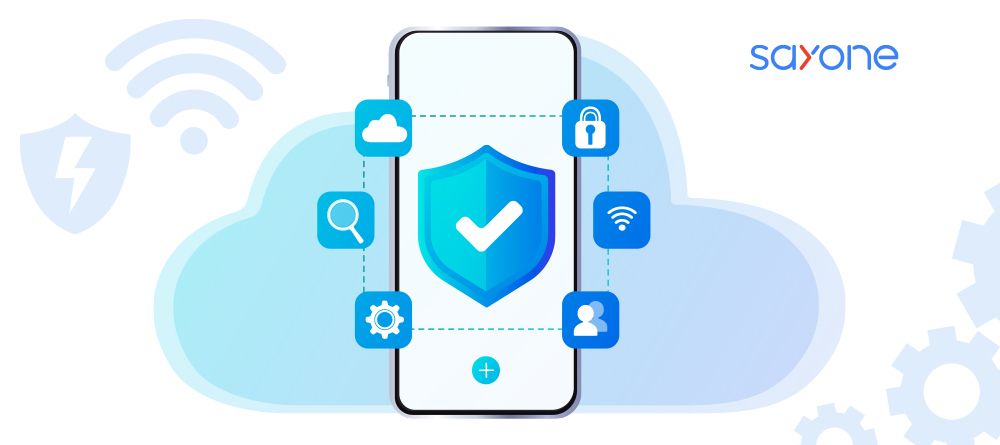
Subscribe to our Blog
We're committed to your privacy. SayOne uses the information you provide to us to contact you about our relevant content, products, and services. check out our privacy policy.

Akhil SundarSeptember 22, 202311 min read

Generating table of contents...
Mobile app security is the practice of safeguarding mobile applications from vulnerabilities and attacks. It includes a variety of methods and techniques to protect both the app and the user data it holds. From coding securely to frequent updates, app security aims to close any gaps that hackers could exploit.
As the number of mobile apps continues to grow, so does the risk of security breaches. A compromised app can lead to data leaks, unauthorized access, and financial loss for both businesses and users. This makes the topic of mobile app security more crucial than ever, particularly for companies looking to build an app.
The demand for apps is on the rise, but users are becoming increasingly aware of security issues. Implementing cloud security posture management is crucial to quickly identify and fix vulnerabilities in app data security.With more people conducting sensitive transactions through apps, whether it's for banking or shopping, the need for stringent security measures is clear.
To successfully navigate the challenges of mobile app security, we'll explore the top best practices in this blog. The focus is to provide you, the reader, with actionable steps to enhance the security of your mobile applications.
By understanding the best practices of mobile app security, you can develop an app that meets user needs and safeguards against potential risks.
Let's explore the 7 Best Practices to follow to develop a mobile application
When building a mobile app, ensuring security starts from the ground up—right from the development stage. Here, we focus on one crucial aspect: secure coding practices.
Prioritizing secure coding practices from the start will save you a lot of trouble down the line. It's always easier to build security in from the beginning than to tack it on later.
Looking to Outsource your mobile app development work ? Read complete guide on How to successfully select your Outsource partner in 2023
One of the pillars of mobile app security is data encryption. If you're in the process of building a mobile app, considering which encryption algorithm to use is crucial. Encryption serves as your first line of defense, transforming readable data into unreadable text that can only be deciphered with the correct key.
To make an informed choice on data encryption, you need to consider various factors like data sensitivity, performance requirements, and potential threats your mobile app might face. Remember to keep your encryption keys safe; they are as important as the encrypted data itself.
Encryption isn't a set-it-and-forget-it aspect of mobile app development. You should review your encryption strategies periodically to adapt to new security challenges.
By paying close attention to data encryption, you add a robust layer of security that protects both your app and its users. It's not just about ticking a security box; it's about building trust and ensuring peace of mind for your user base.
Two-factor authentication (2FA) adds an extra layer of security to your mobile app, going beyond just a username and password. The process involves combining something the user knows (a password) with something the user has (a mobile device) or something unique to the user (like a fingerprint).
In most mobile apps, 2FA starts with a password. After that, users receive a temporary code via SMS, email, or an authenticator app. This code is time-sensitive and expires after a short duration, usually within minutes. Also, an SPF record checker helps ensure that these codes sent through email are delivered securely and not mistaken for spam or phishing.
2FA is particularly useful in apps involving sensitive data or financial transactions. If someone tries to gain unauthorized access, even if they have your password, they won't be able to get past the second layer of authentication without the temporary code or biometric data.
For mobile app developers, adding 2FA isn't overly complicated. Most programming languages and development platforms offer libraries or modules that make it straightforward to implement 2FA. The challenge lies in encouraging users to activate this feature, which often involves user-friendly prompts and easy activation steps.
While 2FA is generally a secure method, it's not entirely foolproof. For instance, SMS-based 2FA can be vulnerable to SIM swapping attacks. As an alternative, consider using hardware tokens or biometrics, like facial recognition or fingerprint scanning, as the second factor.
By implementing 2FA, you're taking an important step in safeguarding your mobile app against unauthorized access. It's a simple yet effective way to add an extra layer of protection for your users.
Read More on the Importance of CI/CD in Mobile App Development. Learn how it helps streamline the process, reduce costs, and speed up deployment
With the rise in mobile app development, securing API endpoints has become crucial. APIs act as gateways, connecting various services and transmitting data. If not properly secured, they can be vulnerable entry points for attackers.
While APIs are essential for app functionality, their security should never be an afterthought. Implementing these best practices can help protect your mobile app and its users from potential threats.
Know about Microservices ? Learn How it Benefits your Mobile App Development
When it comes to mobile app security, penetration testing, often shortened to 'pen testing,' is a key step. A pen test aims to discover vulnerabilities in your mobile app by simulating cyber attacks. The goal is to find weak spots before actual hackers do.
Opt for tools that are commonly used in the industry, like Burp Suite, OWASP ZAP, and Metasploit, among others. These tools can be helpful for both beginners and seasoned professionals.
Read More on 10 Different Types of Mobile Application Testing & Its Tools
Aim to conduct these tests at multiple stages of development. Early testing can help you avoid time-consuming and costly fixes later on. By following these steps, you can better identify the vulnerabilities of your mobile app and work on closing the gaps, thereby ensuring a more secure user experience.
In the fast-paced world of mobile app development, staying up-to-date is more than just a good practice—it's essential for security. If you're planning to build a mobile app, consider this: threats evolve continually. New vulnerabilities may appear, and outdated security measures are a playground for hackers. That's why it's crucial to release regular updates and patches for your app.
Fix Known Issues: Updates address known security gaps. Ignoring these can expose your app to unnecessary risks.
Improve Performance: Not all updates are about security. Some focus on making the app run more smoothly, which can indirectly boost your app's security by making it less prone to crashes and errors.
Patches are quick fixes that take care of specific issues between major updates. They're vital because they provide immediate solutions to newly discovered threats or vulnerabilities. Waiting until the next major update could be too late and put your users at risk.
Checkout The Role of IoT in Mobile App Development
Transparency is key. Keep your app users informed about the updates and what changes they bring. Encourage them to install the latest versions. Educate them on the risks of not updating the app without using technical jargon.
By keeping your app updated and patched, you protect your business and earn your users' trust. Your app becomes a safer place for them, and that's a win-win for everyone involved.
When it comes to mobile app security, it's vital to remember that it's not solely the domain of developers or IT teams. Users play an essential role, too. Even the most secure apps can face threats if users aren't equipped with basic security knowledge. Hence, one of the fundamental steps in ensuring mobile app security is educating the users about it.
When teaching users about security, there are several key areas to focus on:
Firstly, stress the need for strong, unique passwords and the importance of updating them periodically. Next, it's crucial for users to approach links and downloads with caution, even if they seem to come from familiar sources. Also, it's beneficial to recommend that users access the app over secure Wi-Fi networks, discouraging them from using open or public networks.
As for the methods to deliver this education, consider integrating real-time advice through tooltips or pop-up messages within the app. Including a basic guide or FAQ section addressing major security concerns can also be beneficial.
Email newsletters can be a good medium to keep users informed about security issues and tips. And don't forget about the potential of your company's social media channels for sharing security advice and news. If you're using LinkedIn, you could locate your users’ emails via a LinkedIn email finder and start an educational email marketing campaign to deliver valuable info.
In 2023, Mobile app security remains more critical than ever. Every step is vital from the development stage, where secure coding sets the base, to implementing two-factor authentication and encrypting data.
Don't overlook API security, and make sure to conduct penetration tests to identify weak spots. Keeping your app updated with the latest security patches can keep you a step ahead of threats. Educating your users about safe practices can also add another layer of protection.
Why Choose SayOneTech for Your Secure App Development
If you're serious about building a mobile app with top-notch security features, consider partnering with SayOnetech. With years of experience in mobile app development, SayOneTech understands the ins and outs of creating an app that meets your business needs and is built with the latest security measures in place. Make your app's security a priority from day one, and you'll have a foundation that stands the test of time.
Ready to build a secure and reliable mobile app? Contact SayOneTech today, and let us guide you through every step of the development process. Your app's security is our priority.

We're committed to your privacy. SayOne uses the information you provide to us to contact you about our relevant content, products, and services. check out our privacy policy.

About Author
Subject Matter Expert

We collaborate with visionary leaders on projects that focus on quality